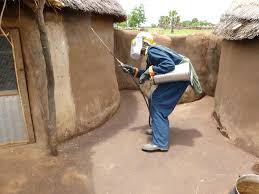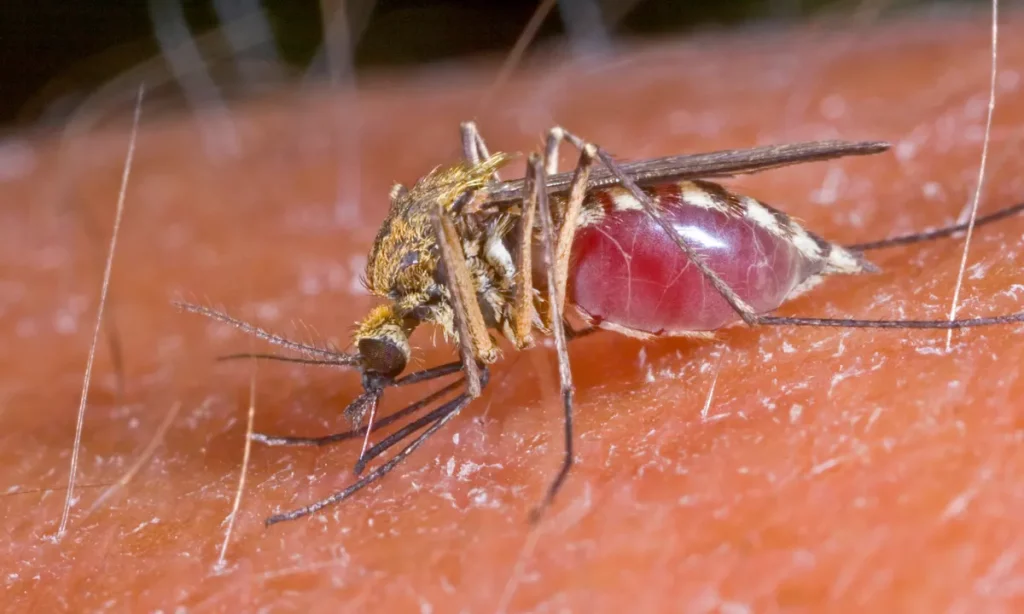
A heath worker spraying pesticide in some village in Northern Uganda
By George Bukenya
As Uganda joins the rest of the world to commemorate the world Malaria Day, which is celebrated on every 25th day of April every year, the disease is still the leading claimer of lives in the country despite several interventions made to eradicate it.
This makes Uganda to be one of the countries globally with the highest malaria burden with over 90% of her population at risk; the disease remains the country’s leading cause of death especially in children.
According to the latest research, health Centres in the country on average receive between 30-50 percent outpatients and 15-20 admissions which cases experts say are still very high.
The Asst. Commissioner, National Malaria Control Division Dr. Jimmy Opigo said that since year 2009, Malaria prevalence reduction has more than trebled from 43% in 2009 to the current 9.1%.
He said that Malaria morality rate especially in the under-five year old is now less than 2% although outpatient department attendance still remains high (20-50%) with a high test positivity rate of above 50% in some areas.

The year’s Theme is: ‘‘Say No to Malaria Deaths’. `Malaria Shouldn’t Defeat Us’“ is in line with the objective of ending malaria death by 2030.
Ministry of Health Director General Health Services Dr. Henry G. Mwebesa revealed that the mosquito which is the carrier of parasite has learnt escape routes from arsenals such as anti-malarials and insecticides, aimed at demobilizing them.
Dr. Mwebesa said that due to such a challenge, there’s a need to have science guided interventions for Malaria Control Programs.
In an effort to reach the target of having “a Malaria Free Uganda by 2030”, government is planning to commence a Malaria vaccination programme.
But this according to the Minister of State for Health, Halifa Kawooya has a challenge in that negativity on vaccination is increasing and this manifested in the just concluded Yellow Fever vaccination exercises carried out received a low turn up.
The Minister while presiding on the two day workshop dabbed as Scientific Colloquium 2024 there’s still a need to vigorously campaign for mass vaccination especially for Malaria that is planned next if it’s to achieve positive
Outcomes.
The Scientific Conference was aimed at bringing scientists together so as to make recommendations for possible adoption as strategies to nip malaria in the bud to help the country achieve its target getting rid of malaria by 2030.
The Deputy Speaker of Parliament Rt. Hon Thomas Tayebwa advised Ugandans to fight mosquitoes with plant repellents and clearing bushes around their homes.
He argues that it doesn’t necessarily have to be about money but mobilization of communities and sensitization of the people can play equally important role in the fight against Malaria which kills 52 Ugandans daily and accounts to economic loss of UGX 2.4 trillion per year.
“It’s also about mobilisation of the communities. We need to take imitative as leaders and go back to our communities and sensitize them so that they can get tested, clear bushes around their homes and use plants which are mosquito repellent and use the nets for the purpose they are meant to serve.’’ Rt. Hon Tayebwa said.
He also tasked the Ministry of Health to promote planting of greenery that repels mosquitoes but also intensifies community mobilisations.
“Most of the time we have focused on the distribution of nets but if you give nets without proper sensitisation of the people, that’s how they end up using them for fishing, making ‘Malwa’, alcohol and all that. It is very painful and our focus on only distribution of nets especially in rural areas won’t help.’’ He said
In 2021, the World Health Organisation reported that there were an estimated 13 million malaria cases and over 19,600 estimated deaths in the country.
As legislators, he added: “it’s our duty to ensure that indeed the right measures are put in place as far as fighting malaria in the country is concerned. We are all in this together so we need to take action before it’s too late.”
“Political engagement is so important to combating malaria and as Parliamentarians we can use our influence and platforms to support initiatives and ultimately help make key decisions regarding policies and budget allocations.’’
For any comment or story idea reach us on 0756 749901/0770 845082 or email: bgbukenya@gmail.com